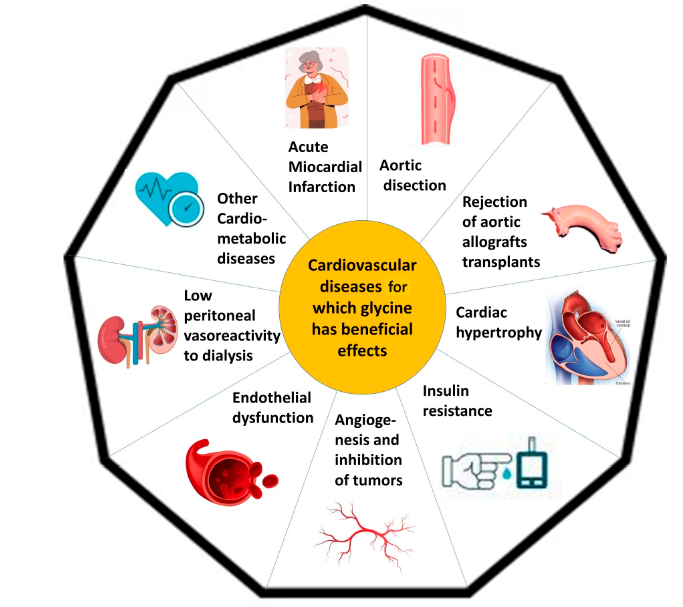Glycine is an anti-biotic, restores sensitivity to antibiotics
-
Glycine is even more of an all rounder than we already thought.
Not only does it function as an anti-biotic itself, completely killing several pneumonia bacteria strains at a concentration of about 0.4M in vitro. But it also restores sensitivity to other antibiotics, making them more effective again.
This could be extremely useful in case of an emergency. Glycine is very safe, cheap and available.
The concentration where a complete killing of the bacteria occurred was around 0.4M . If I calculated that right that is around 150g for a human, a very high dose. But that dose is for complete eradication, an anti-bacterial effect will be present in lower doses as well, just as the restoration of the sensitivity to other antibiotics should be present.

https://pmc.ncbi.nlm.nih.gov/articles/PMC11302245/figure/F1/
-
This post is deleted! -
@Insomniac no lol lethal dose is wayyy more
-
@Insomniac just to be clear I wouldn't advise anybody to take that much glycine.
And like I said the respective benefits will probably seen at a much smaller dose as well.
There is such a thing as too much glycine. I remember reading about 500mg/kg body weight as the cut off dose.
-
I wonder what mechanism is involved with glycine acting as an antibiotic.
Urea is also an antibiotic, when it cleans up decaying flesh such that no rotting flesh is left to provide food for bacteria to multiply.
-
@yerrag This study suggests that lowers the GSH/GSSG ratio, causing oxidative stress in the cell.
"More specifically, in Vibrio alginolyticus and Escherichia coli, exogenous glycine promotes oxidation of GSH to GSH disulfide (GSSG), disrupts redox balance, increases oxidative stress and reduces membrane integrity, leading to increased binding of complement."
https://www.sciencedirect.com/science/article/pii/S2213231722002841 -
You might want to take your weekly dose of antibiotics with some glycine .
This study showed that combining glycine with amoxicillin decreased the minimal amount necessary to reduce H. Pylori by 90% !"The combination of AMX and glycine showed synergistic activity, with the minimum bactericidal concentration of AMX with glycine decreasing to 1/10 that of AMX alone."
-
@Mauritio said in Glycine is an anti-biotic, restores sensitivity to antibiotics:
@yerrag This study suggests that lowers the GSH/GSSG ratio, causing oxidative stress in the cell.
"More specifically, in Vibrio alginolyticus and Escherichia coli, exogenous glycine promotes oxidation of GSH to GSH disulfide (GSSG), disrupts redox balance, increases oxidative stress and reduces membrane integrity, leading to increased binding of complement."
https://www.sciencedirect.com/science/article/pii/S2213231722002841The body has the wisdom to know of using glycine to turn the redox ratio against pathogens to kill them by oxidative stress? Awesome. What part of the immune system is involved. eg white blood cells, peptides etc?
-
Call me simple-minded but doesn't this go back to the idea of eating Jell-O? This is what our grandparents always ate when sick, but also for dessert, for lunches, etc. (50s were a different time).
What is the main difference between glycine and gelatin?
-
@Corngold said in Glycine is an anti-biotic, restores sensitivity to antibiotics:
Call me simple-minded but doesn't this go back to the idea of eating Jell-O? This is what our grandparents always ate when sick, but also for dessert, for lunches, etc. (50s were a different time).
What is the main difference between glycine and gelatin?
I used to make a dense Jello, in order to get daily glycine. I don't think it's a matter of a difference, but that gelatin, by way of Jello, is a way to get glycine via food. I can usually take gelatin in Jello, better than a glycine supplement; though, I can have trouble with gelatin, e.g., gut distress, digestive issues. The effects of a glycine supplement for me are much more consistent and harsh, e.g., fatigue, grogginess, irritability, to name a few, and they can last for days.
-
Great post.
Im just starting high dose niacinamide x tmg 3 times per day with fenbendazole, should work incredible in synergy
I would also think TMG is alot more dose potent vs regular glycine
-
@yerrag said in Glycine is an anti-biotic, restores sensitivity to antibiotics:
@Mauritio said in Glycine is an anti-biotic, restores sensitivity to antibiotics:
@yerrag This study suggests that lowers the GSH/GSSG ratio, causing oxidative stress in the cell.
"More specifically, in Vibrio alginolyticus and Escherichia coli, exogenous glycine promotes oxidation of GSH to GSH disulfide (GSSG), disrupts redox balance, increases oxidative stress and reduces membrane integrity, leading to increased binding of complement."
https://www.sciencedirect.com/science/article/pii/S2213231722002841The body has the wisdom to know of using glycine to turn the redox ratio against pathogens to kill them by oxidative stress? Awesome. What part of the immune system is involved. eg white blood cells, peptides etc?
I guess it'd similar to how quinones work. They also have a pro-oxidant effect.
-
I was thinking though in terms of a biological enabler that makes the glycine into molecules that causes a change toward a high GSSG/GSH ratio, to make it oxidative enough to kill bacteria. In the same way that neutrophils and macrophages would make ROS by respiratory burst action acting as phagocytes.
-
I like to read good things about the staples that I have added to my diet. Cardiovascular diseases are the big driver for my daily glycine consumption. I was delighted to learn that it is also an anti-biotic.
Glycine’s main positive impacts on cardiovascular health.

-
In light of this thread, the findings of this old thread by haidut are even more interesting.
-
@Mauritio said in Glycine is an anti-biotic, restores sensitivity to antibiotics:
In light of this thread, the findings of this old thread by haidut are even more interesting.
I'm puzzled. How can glycine be helpful if it feeds the bacteria? Aren't we supposed to deprive the bacteria of its food source to have an antibiotic effect such that the bacteria would just not be able to multiply and become a thriving colony by being deprived of its food source? How is providing more gelatin going to help?